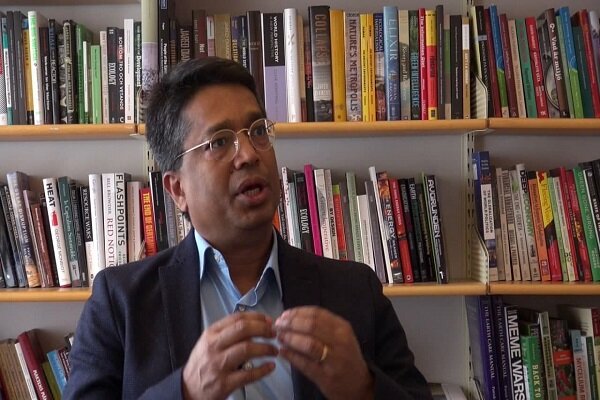U.S. cementing China-Russia partnership through war hysteria: Indian professor

TEHRAN - A leading Indian academic says that America is helping cement the partnership between its foes by its hostile attitudes towards China and Russia.
“By creating war hysteria over Ukraine and Taiwan and building military alliances like Quad and AUKUS, the U.S. has helped cement the partnership between China and Russia,” Ashok Swain tells the Tehran Times.
Swain, professor of peace and conflict research at the Department of Peace and Conflict Research at Uppsala University, points to American intelligence assessment that “lists the alignment between China and Russia as the biggest security threat to the U.S. But, instead of diplomatically trying to divide the two, the U.S. is doing everything to make their alliance stronger.”
Following is the text of the interview:
Q: How do you see the escalation of conflict between the U.S. and Russia over Ukraine? Is it media hype or something else?
A: Ukraine has become the flashpoint between the U.S. and Russia for some years now. Russia sees the NATO enlargement to become almost double of its size after the end of the Cold War with grave suspicion and great resentment. The Russian president has put a redline in Ukraine. I believe that the U.S. needs to understand Russia’s security concerns instead of unnecessarily provoking another military crisis. When the world is struggling to survive the Pandemic, and climate change has threatened the survival of the planet, it doesn’t make sense for the U.S. to provoke Russia on the issue of Ukraine further. When Germany and even the president of Ukraine don’t want the conflict to escalate and play down the Russian threat, it exposes the hollowness in U.S.’s claim. The U.S. dispatch of more troops, fighter jets, and ships to Eastern Europe brings more insecurity to the region rather than security. The act is an unnecessary escalation of the crisis, and it dangerously comes close to becoming an active military conflict. The U.S. political leadership is bargaining world peace just for some perceived benefits in domestic politics.
“The U.S. has a tendency not to learn from history, and it tends to keep committing the same mistakes.”Q: Do you think that NATO is going to surround Russia or will surrender?
A: Surrender is a strong word. However, I don’t see any possibility of the U.S. waging war against Russia. We must remember that the U.S. army had made a humiliating withdrawal from Afghanistan after 20 years of war only five months ago. It is almost unthinkable that the same army will go to a direct war against Russia now. A direct war between the U.S. and Russia could be the last war the world will ever fight. Negotiation is the only way out of this crisis, as a war between Russia and the U.S. is not an option. The increased American military buildup can possibly have a positive effect if it brings a strategic stalemate and both parties return to the negotiation table. But it is a dangerous strategy if good sense does not prevail from both sides.
Q: What would be the U.S.'s reaction if another power tries to enter into its backyard or sphere of influence?
A: Each big power in the world considers its neighborhood its area of influence. It should have been kept in mind when NATO expansion was carried out after the collapse of the Soviet Union. But, the problem is that the U.S. has a tendency not to learn from history, and it tends to keep committing the same mistakes.
Q: Why is the U.S. insisting on entering other powers' sphere of influence like escalation with Russia over Ukraine and China over Taiwan?
A: The U.S. dreams of retrieving the same dominant position in the global power table as it had in the first two decades after the end of the Cold War. But the world has changed. China has become a very powerful challenger, and its alliance with Russia has shifted the balance in its favor. American intelligence assessment lists the alignment between China and Russia as the biggest security threat to the U.S. But, instead of diplomatically trying to divide the two, the U.S. is doing everything to make their alliance stronger. By creating war hysteria over Ukraine and Taiwan and building military alliances like Quad and AUKUS, the U.S. has helped cement the partnership between China and Russia. The U.S. policy vis-à-vis China and Russia is just hubris and does not make any sense as it is only self-harming and expediting the process of bringing a formal end to Pax-Americana.
Q: How do you read new moves of Iran, China and Russia in exercising joint military parades? Is that a reaction to U.S. interventionalist policies?
A: China and Russia are working in close partnership worldwide to build a new strategic partnership. They have been aligning with key regional powers in different parts of the world to expand their political and military reach. Their close cooperation with Iran is part of the strategy to gain the upper hand in the Middle East/West Asia geopolitics vis-à-vis the U.S.
Leave a Comment